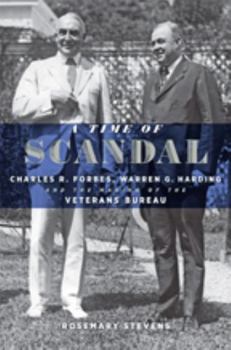A Time of Scandal: Charles R. Forbes, Warren G. Harding, and the Making of the Veterans Bureau
Was the founding director of the US Veterans Bureau a criminal--or a scapegoat?
In the early 1920s, with the nation still recovering from World War I, President Warren G. Harding founded a huge new organization to treat disabled veterans: the US Veterans Bureau, now known as the Department of Veterans Affairs. He appointed his friend, decorated veteran Colonel Charles R. Forbes, as founding director. Forbes lasted in the position for only eighteen months before stepping down under a cloud of criticism and suspicion. In 1926--after being convicted of conspiracy to defraud the federal government by rigging government contracts--he was sent to Leavenworth Penitentiary. Although he was known in his day as a drunken womanizer, and as a corrupt, betraying toady of a weak, blind-sided president, the question persists: was Forbes a criminal or a scapegoat?
Historian Rosemary Stevens tells Forbes's story anew, drawing on previously untapped records to reveal his role in America's initial and ongoing commitment to veterans. She explores how Forbes's rise and fall in Washington illuminates President Harding's efforts to bring business efficiency to government. She also examines the Veterans Bureau scandal in the context of class, professionalism, ethics, and etiquette in a rapidly changing world. Most significantly, Stevens proposes a fascinating revisionist view of both Forbes and Harding--and raises questions about not only the validity but the source of their respective reputations. They did not defraud the government of billions of dollars, Stevens convincingly documents, and do not deserve the reputation they have carried for a hundred years.
Packed with vibrant characters--conniving friends, FBI agents, and rival politicians split by sectional and ideological interests as well as gamblers, revelers, and wronged wives--A Time of Scandal will appeal to anyone interested in political gossip, presidential politics, the "Ohio Gang," and the 1920s.





